Psychology Chapters 12
1/63
There's no tags or description
Looks like no tags are added yet.
Name | Mastery | Learn | Test | Matching | Spaced |
|---|
No study sessions yet.
64 Terms
Personality
Personality is a pattern of enduring, distinctive thoughts, emotions, and behaviors that characterize the way a person adapts to the world.

What determines personality according to psychodynamic theory?
Personality is determined both by current experiences and by early life experiences.
How can personality be better understood in psychodynamic theory?
Personality can be better understood by examining it developmentally as a series of stages that unfold with the individual's physical, cognitive, and socioemotional development.
What role do experiences play in shaping personality in psychodynamic theory?
We mentally transform our experiences, giving them meaning that shapes our personality.
What does psychodynamic theory say about the conscious mind?
The mind is not all conscious; unconscious motives lie behind some of our puzzling behavior.
What conflict does psychodynamic theory suggest exists within individuals?
The person's inner world often conflicts with the outer demands of reality, creating anxiety that is not easy to resolve.
Id
Id is the unconscious drive and is the person's reservoir of sexual energy. In Freud's view, the id has no contact with reality. The id works according to the pleasure principle: the Freudian concept that the id seeks immediate gratification.
Ego
Ego is the Freiudian structure of personality that deals with the demands of reality. Ego abides by the reality principle. It tries to get the id that it wants within the norms of society. Ego is partially conscious and houses mental functions such as reasoning, problem solving, and decision making.
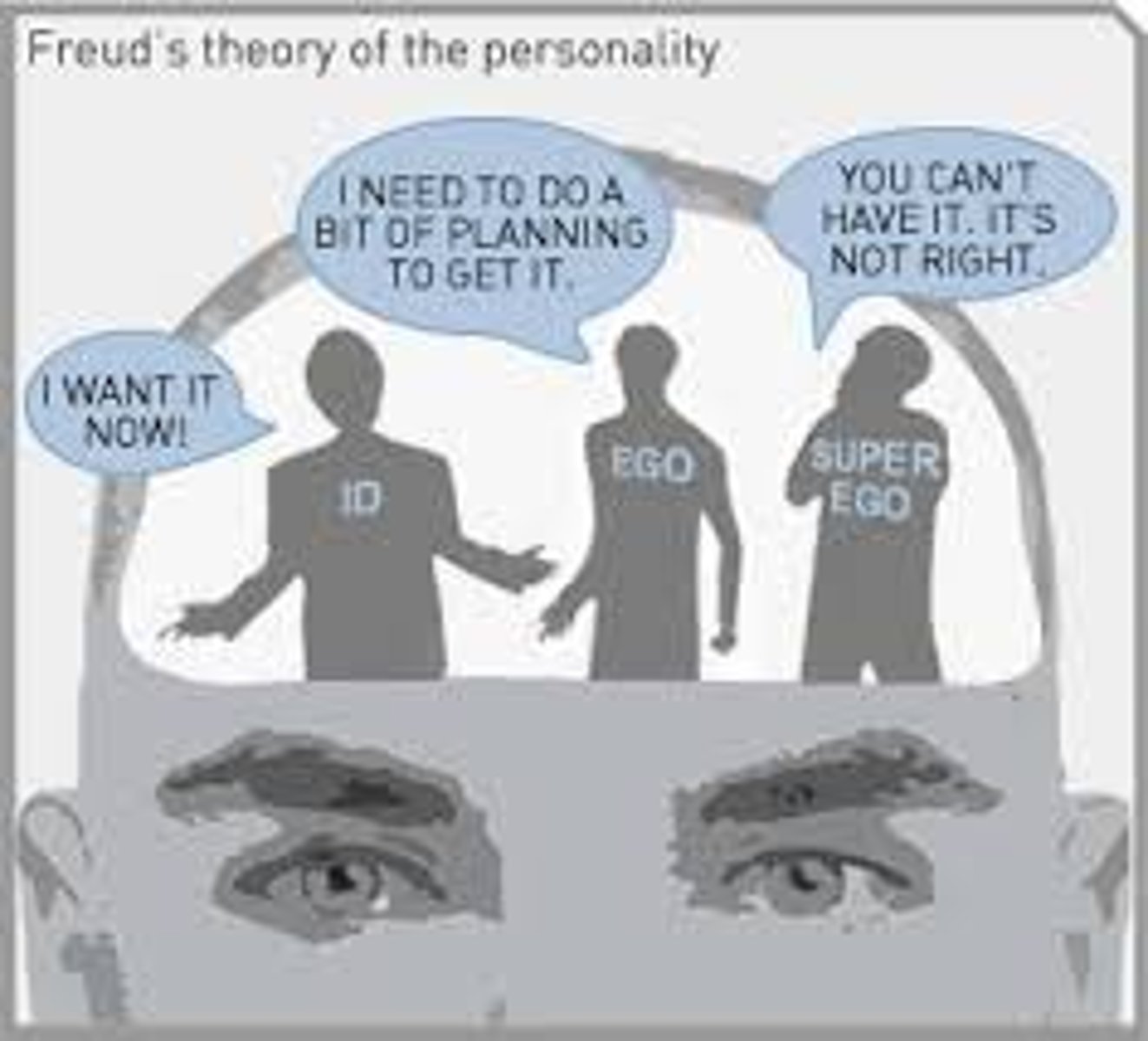
Super Ego
Superego is the harsh internal judge of our behavior. The superego is reflected in what we often call conscience and evaluates morality of our behavior.
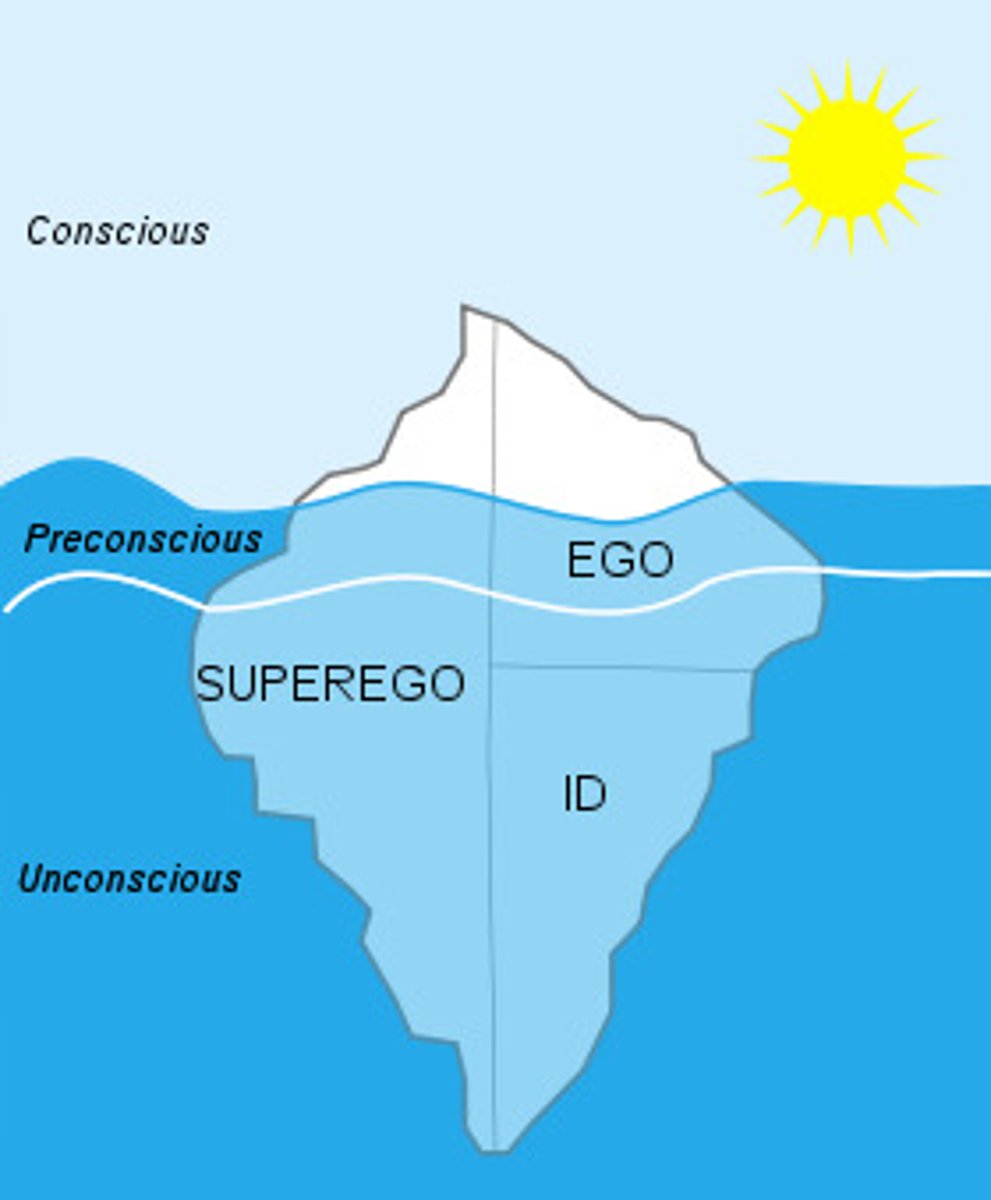
Defense mechanisms
Defense mechanisms are tactics the ego uses to reduce anxiety by unconsciously distorting reality.
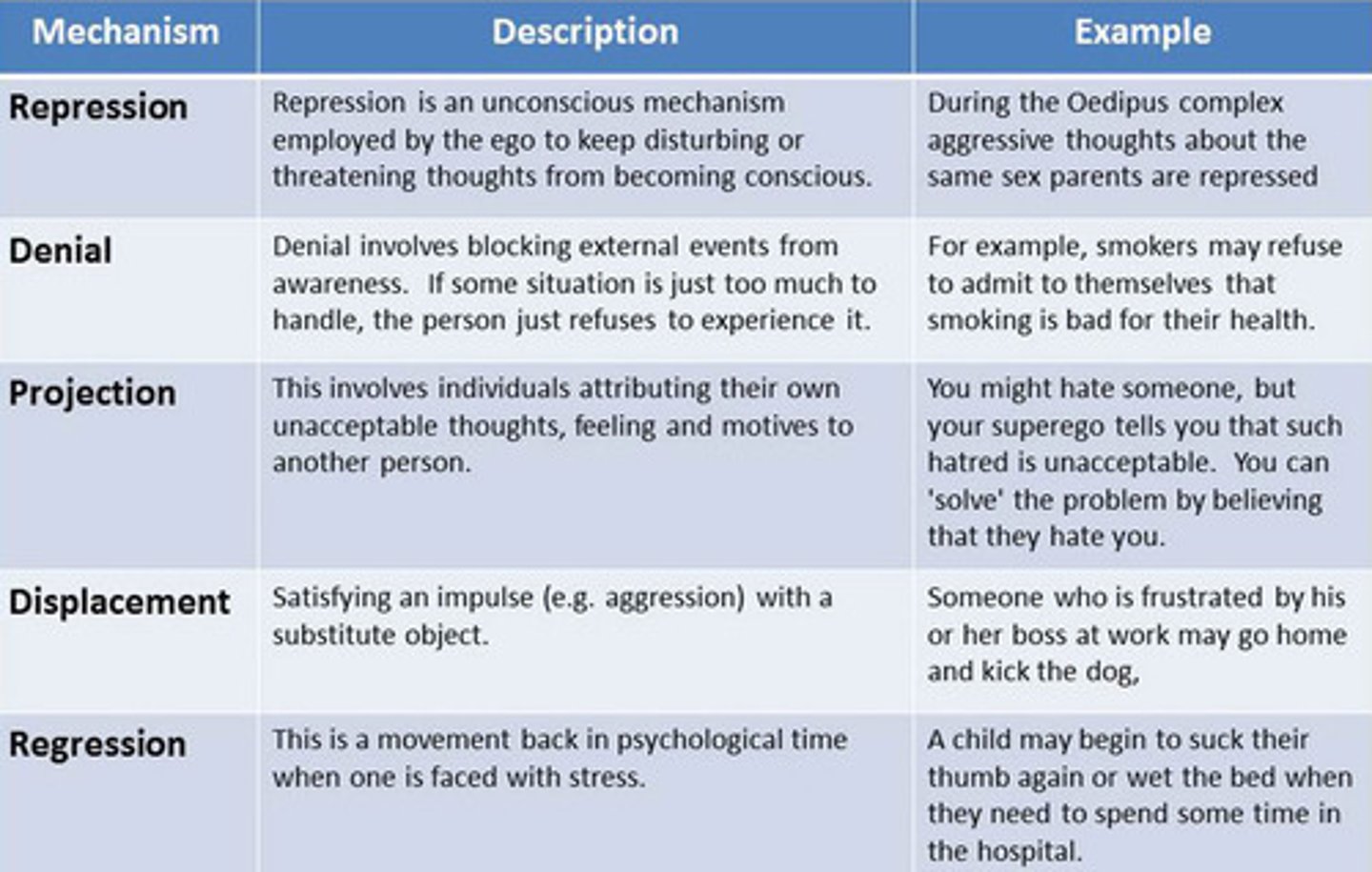
Repression (Defense Mechanism)
The master defense mechanism; the ego pushes unacceptable impulses out of awareness, back into the unconscious mind
Rationalization (Defense Mechanism)
The ego distorts the facts to make an experience less threatening.
Displacement (Defense Mechanism)
The ego shifts feelings toward an unacceptable object to another, more acceptable object.
Sublimation (Defense Mechanism)
The ego replaces an unacceptable impulse with a socially acceptable one.
Projection (Defense Mechanism)
The ego attributes personal shortcomings, problems, and faults to others.
Reaction Formation (Defense Mechanism)
The ego transforms an unacceptable motive into its opposite.
Denial (Defense Mechanism)
The ego refuses to acknowledge anxiety-producing realities.
Repression (Defense Mechanism)
The ego seeks the security of an earlier developmental period in the face of stress.
Oral stage (first 18 months)
The infant's pleasure centers on the mouth. Sucking, chewing, and biting are the activities that reduce tension in the infant.
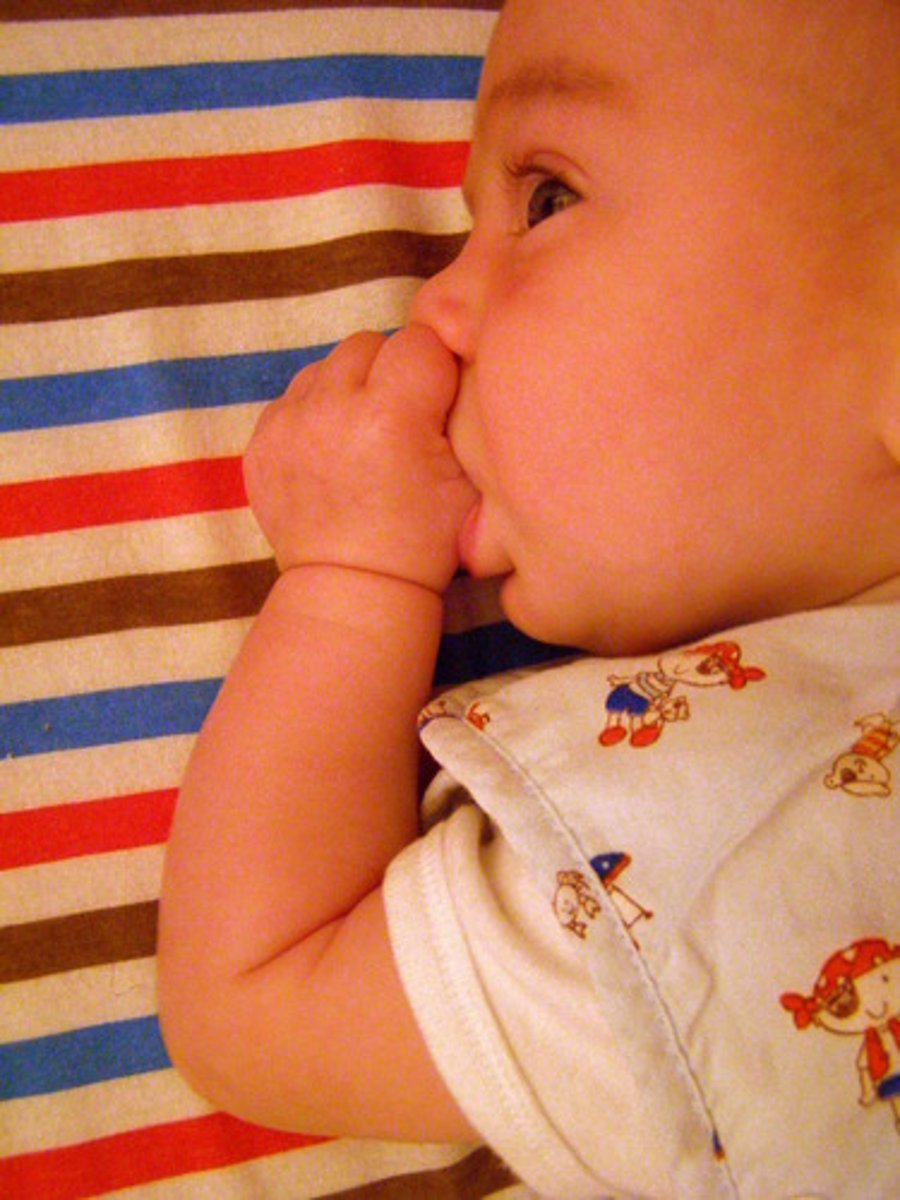
Anal stage (18-36 months)
During a time when most children are experiencing toilet training, the child's greatest pleasure involves the anus and urethra and their functions. Freud recognized that there is pleasure in "going" and "holding it" as well as in the experience of control over one's parents deciding when to do either.

Phallic stage (3-6 years)
Pleasure focuses on the genitals as the child discovers that self-stimulation is enjoyable.

Opedius Complex
Oedipus complex is the boy's intense desire to replace his father and enjoy the affections of his mother. Eventually, the boy recognizes that his father may punish him for his incestuous wishes, specifically by cutting off his penis.
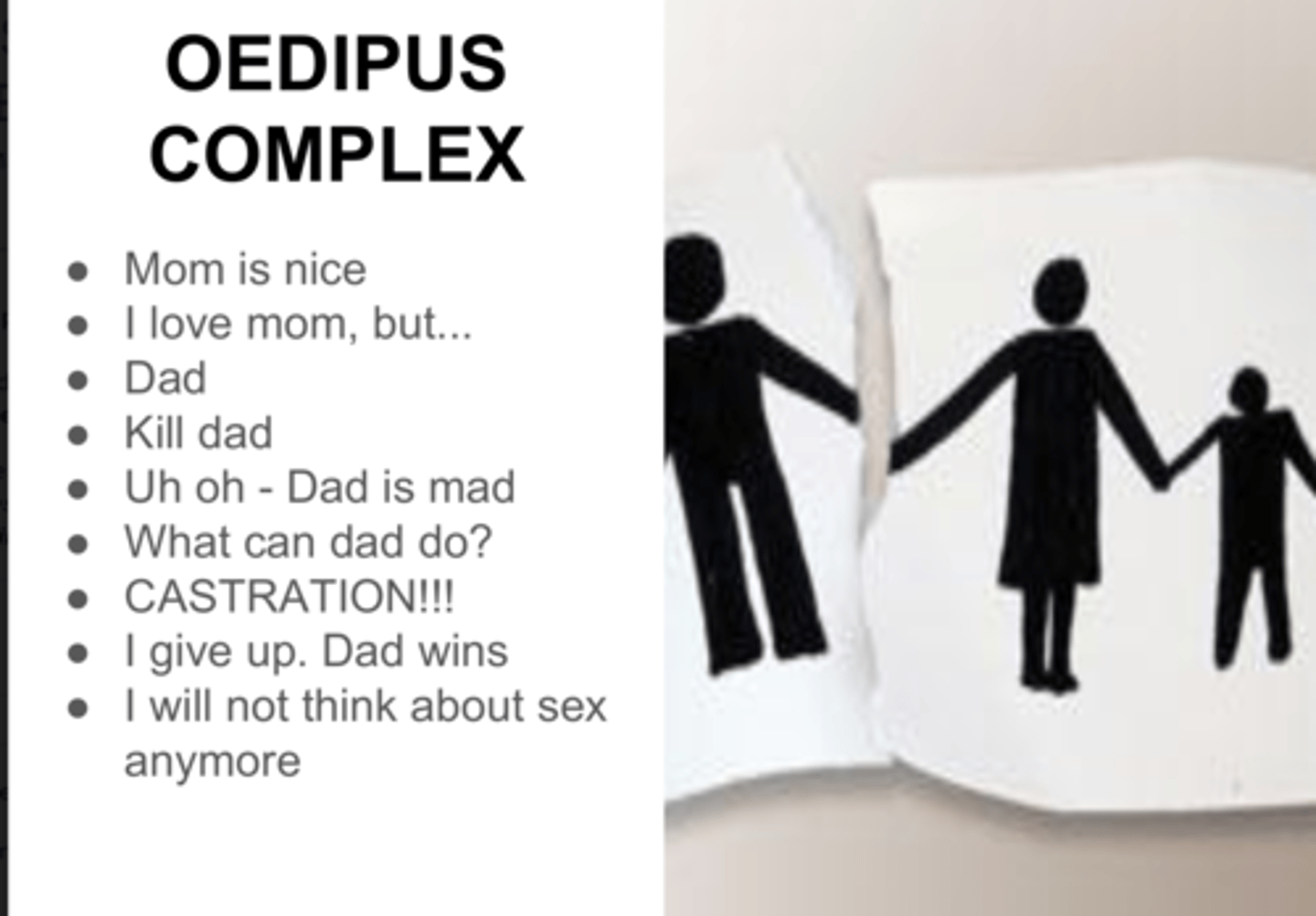
What did critics say of Freud's psychoanalytic theory that lacked or misguided information
Freud's critics said that his ideas of sexuality, early experience, social factors, and the unconscious mind were misguided.
What did revisionists of the psychoanalytic theory add and clarify?
Sexuality is the pervasive force that Freud believed it to be. Furthermore, the Oedipus complex is not as universal as Freud maintained.
Freud's concepts were heavily influenced by the setting in which he lived--Vienna, a society that, compared with contemporary society, was sexually repressed and male dominated. Freud's views of women were especially limited and inaccurate. Moreover, his views of gender were deeply entrenched in gender binary.
The first five years of life are not as powerful in shaping adult personality as Freud thought. Later experiences warrant attention.
The ego and conscious thought processes play a larger role in personality than Freud believed. Achievement, thinking, and reasoning are not always tied to sexual impulses.
Sociocultural factors are much more important than Freud believed. In stressing the id's dominance, Freud placed more emphasis on the biological basis of personality. More contemporary psychodynamic scholars have especially emphasized the interpersonal setting of the family and the role of early social relationships in personality development.
Horney's Sociocultural Approach
Karen Horney rejected the notion that anatomy is destiny. She argued that sociocultural influences on personality development must be considered especially as these apply to the psychology of women. Horney pointed out that women might envy the penis not because of unconscious issues but because of the status that society bestows on those who have one. Horney believed that the central problem in women's lives was a lack of self-confidence and an overemphasis on love relationships.

Evaluating the Psychodynamic Perspectives.
Personality is determined both by current experiences and by early life experiences
Personality can be better understood by examining it developmentally--as a series of stages that unfold with the individual's physical, cognitive, and socioemotional development
We mentally transform our experiences, giving them meaning that shapes our personality.
The mind is not all conscious; unconscious motives lie behind some of our puzzling behavior
The person's inner world often conflicts with the outer demands of reality, creating anxiety that is not easy to resolve
Personality and adjustment are important topics of psychological inquiry.
Self-actualization
Self-actualization is the motivation to develop one's full potential as a human being.
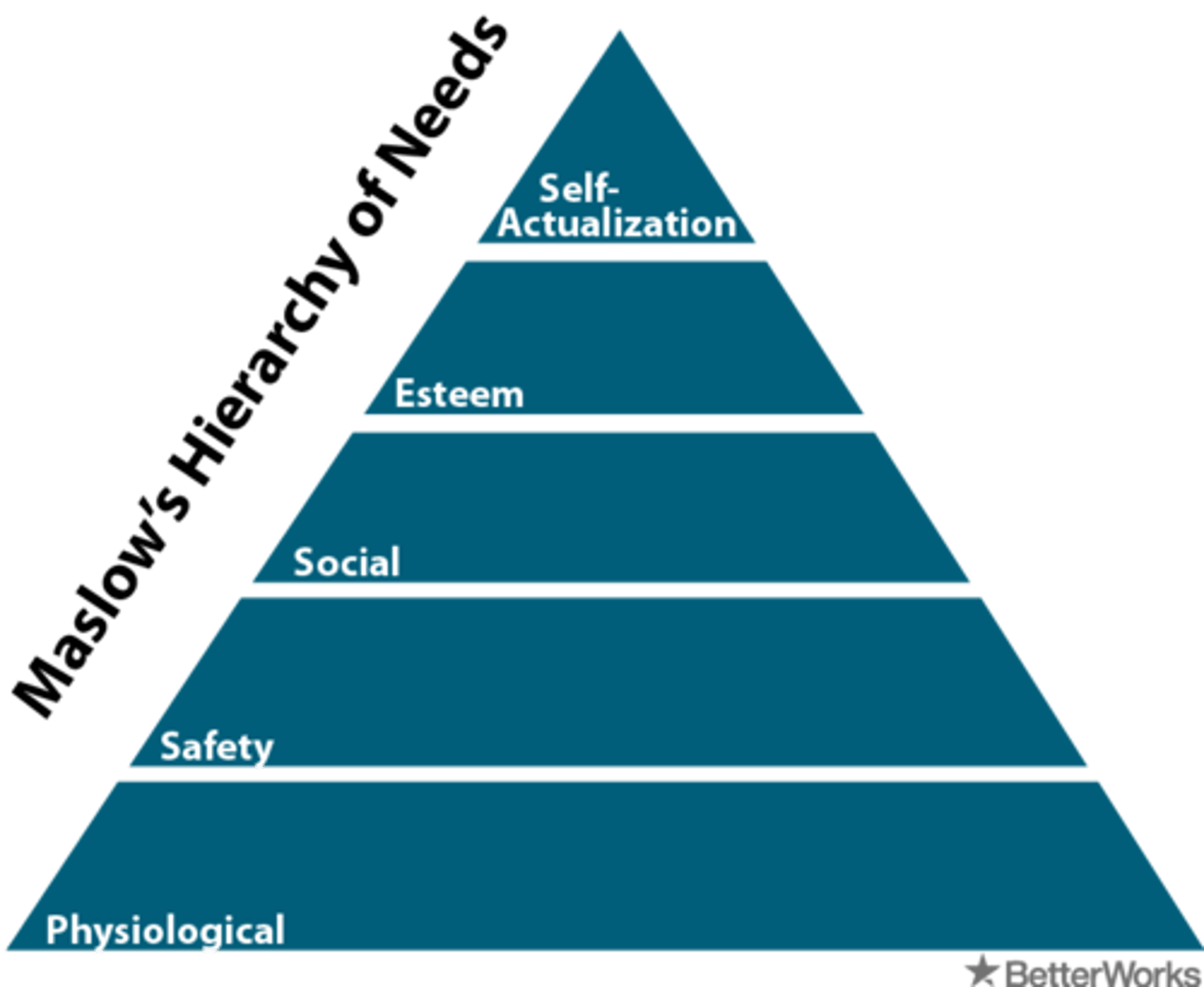
Maslow- self-actualization
Abraham Maslow placed the need for self-actualization at the top of his hierarchy. Maslow described self-actualizers as spontaneous, creative, and possessing a childlike capacity for awe. According to Maslow, a person at this optimal level of existence would be tolerant of others, have a gentle sense of humor, and be likely to pursue the greater good. Self-actualizers also maintain a capacity for "peak experiences," or breathtaking moments of spiritual insight.
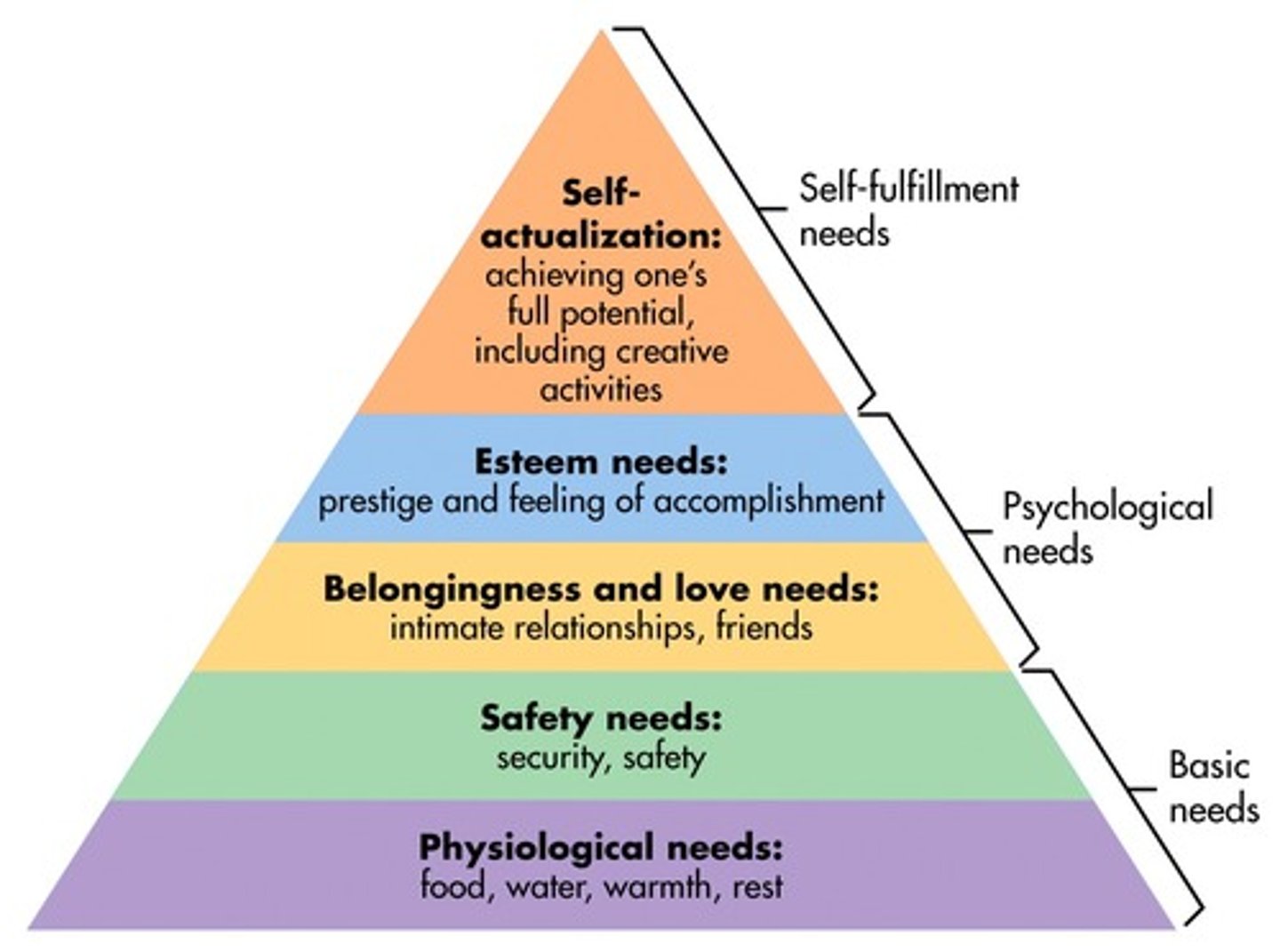
Who created the idea of self-concept, unconditional positive regard, conditions of worth and how to obtain optimal functioning for the humanistic theory
Carl Rogers believed that everyone is born with the raw ingredients of a fulfilling life. They just need the right conditions to thrive.
Self-concept
Self-concept is the hub of human functioning. Optimally, this self-concept reflects our genuine, innate desires. However, conditions of worth can become part of the self-concept. As a result, we can become alienated from our real feelings and strive to actualize a self that does not represent our authentic desires.
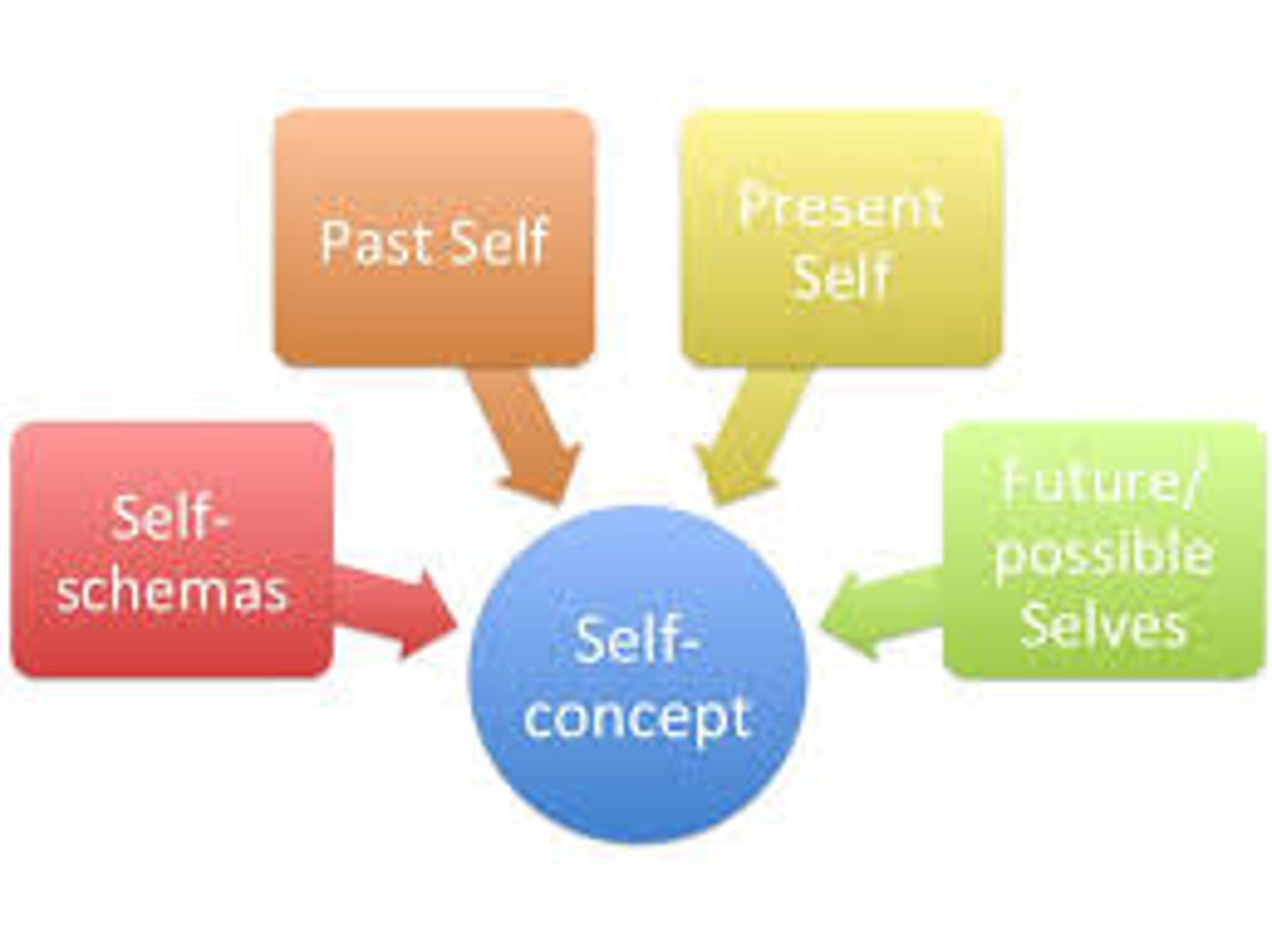
Unconditional positive regard
Unconditional positive regard means being accepted, valued, and treated positively regardless of one's behavior.

Conditions of worth
Conditions of worth are the standards we must live up to in order to receive positive regard from others.
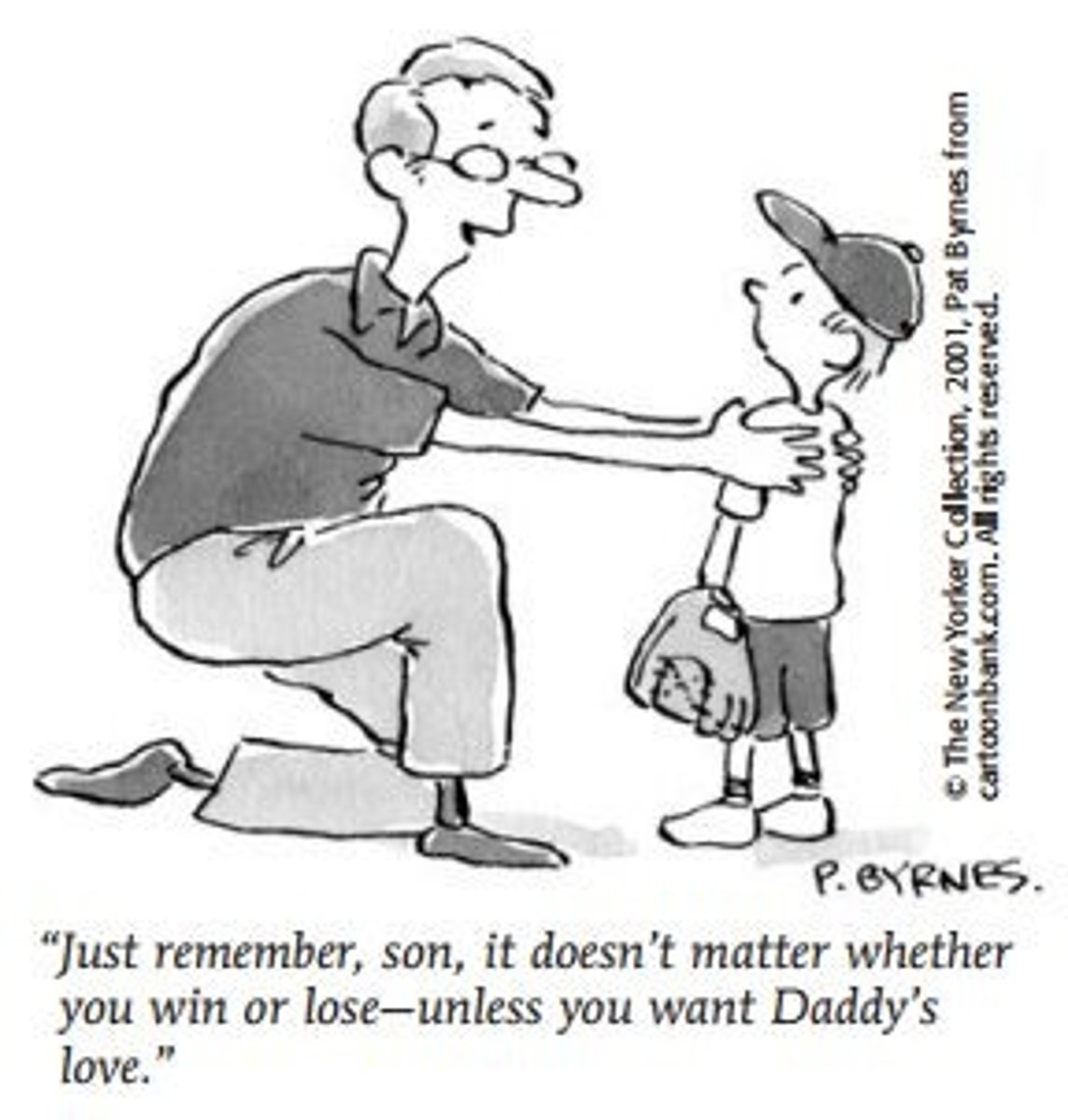
Evaluation of the humanistic theory
Some critics believe that humanistic psychologists are too optimistic about human nature and do not hold people accountable for their behaviors if all human behavior is seen as emerging out of negative situations
Trait theory
Trait theories: Theoretical views stressing that personality consists of broad, enduring dispositions (traits) that tend to lead to characteristic responses
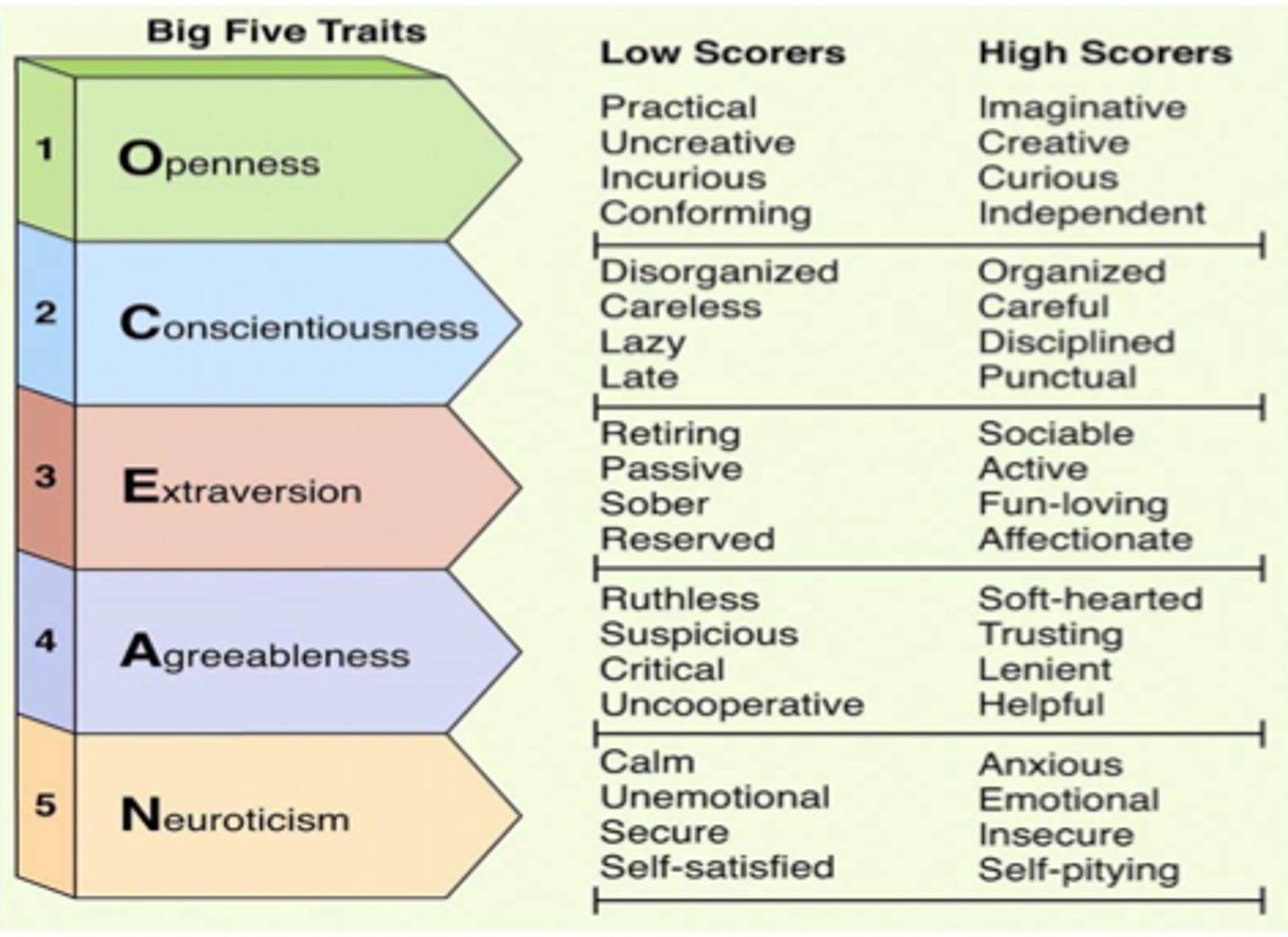
Why do personality psychologists use the trait theory?
Personality psychologists have come to think of these changes in traits as representing personality development because they very often indicate a change from less to greater psychological maturity
- Social dominance, conscientiousness, and emotional stability were found to increase - especially between the ages of 20 and 40
- Social vitality and openness to experience increased most during adolescence but then declined in old age
- Agreeableness showed a steady rise over the life course
- Especially between ages 17 and 24, people are likely to become more responsible and less distressed
Evaluating the trait theory
- Some personality researchers say that these traits might not end up being the ultimate list of broad traits; they argue that more specific traits are better predictors of behavior
- The trait approach has been faulted for missing the importance of situational factors in personality and behavior
- Further, some have criticized the trait perspective for painting personality with very broad strokes
Murray's Personological Approach
the study of personality should look at the entire person over the course of their lifespan.
What did Murray's Personological Approach include
Need for achievement: an enduring concern for attaining excellence and overcoming obstacles
Need for affiliation: an enduring concern for establishing and maintaining interpersonal connections
Need for power: an enduring concern for having an impact on the social world
Social cognitive perspectives
Social cognitive perspectives emphasize conscious awareness, beliefs, expectations, and goals
Reciprocal determinism:
Reciprocal determinism: The relationships among the person, the person's behavior, and the environment are all two-way streets
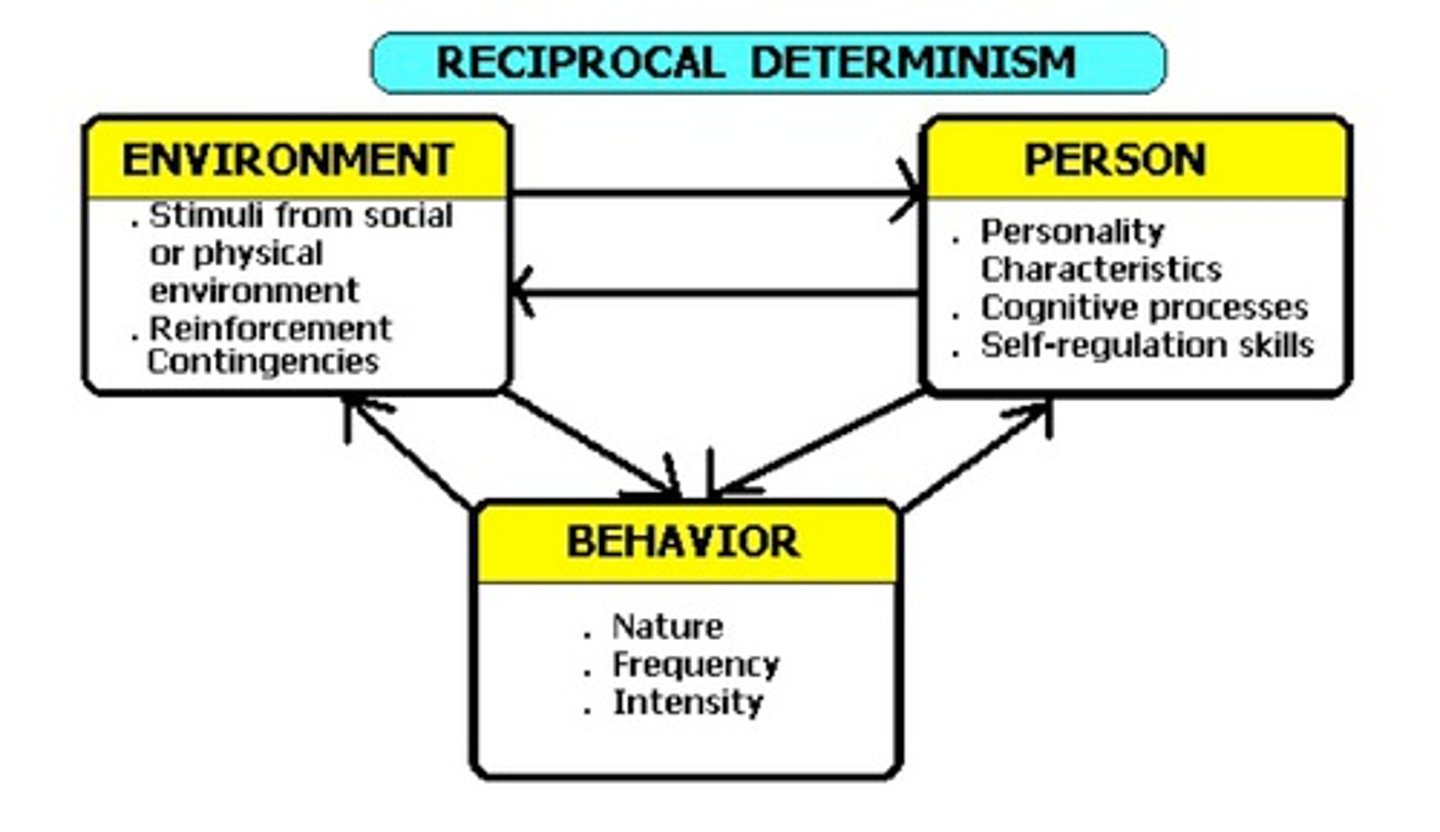
Observational Learning
Social cognitive theorists believe that we acquire a wide range of behaviors, thoughts, and feelings by watching others' behavior and that our observations strongly shape our personality
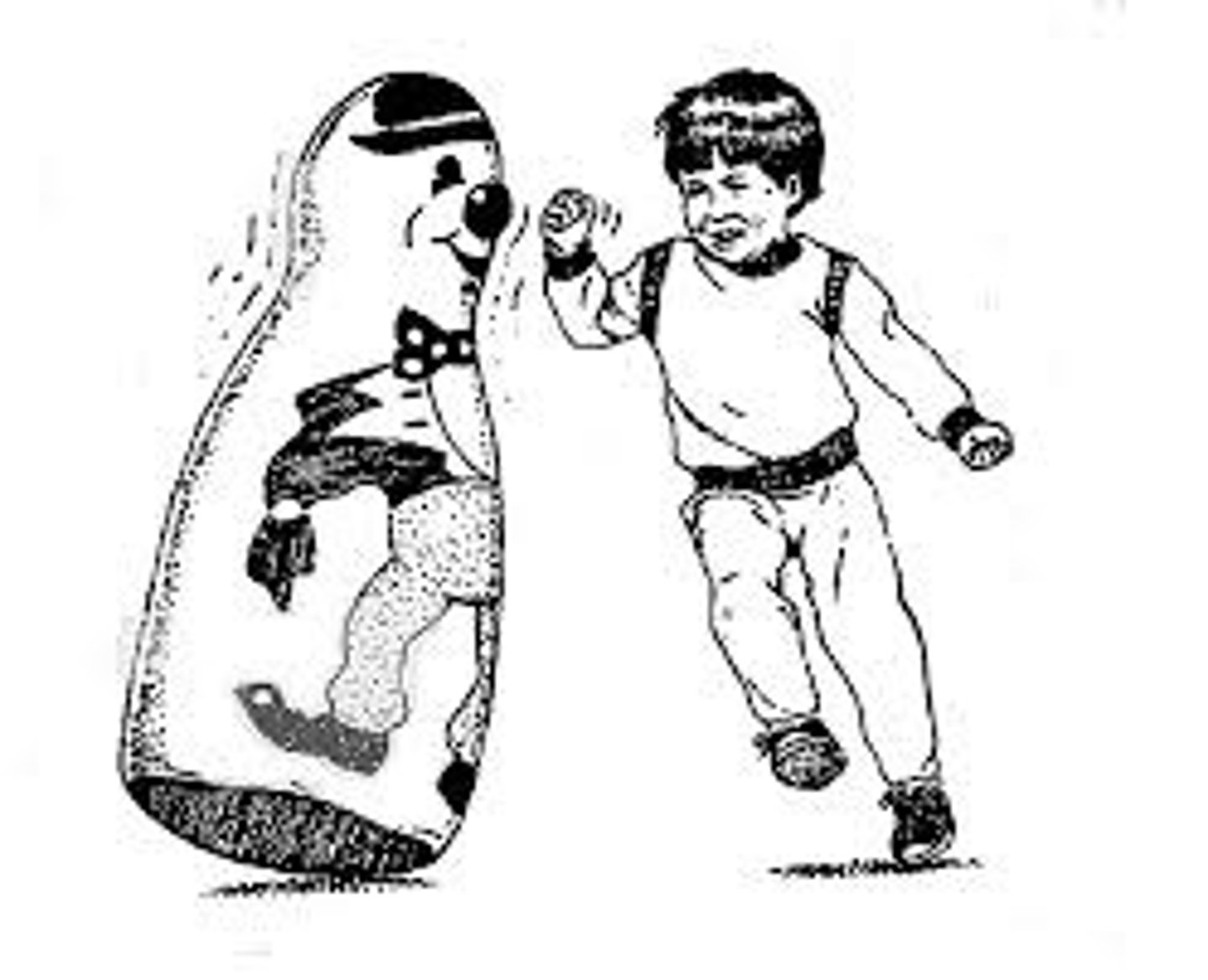
Personal control
Social cognitive theory emphasizes that we can regulate and control our own behavior despite our changing environment. Psychologists commonly describe a sense of behavioral control as coming from inside the person (an internal locus of control) or outside the person (an external locus of control)

Self-efficacy
Self-efficacy: The belief that one can accomplish a given goal or task and produce positive change
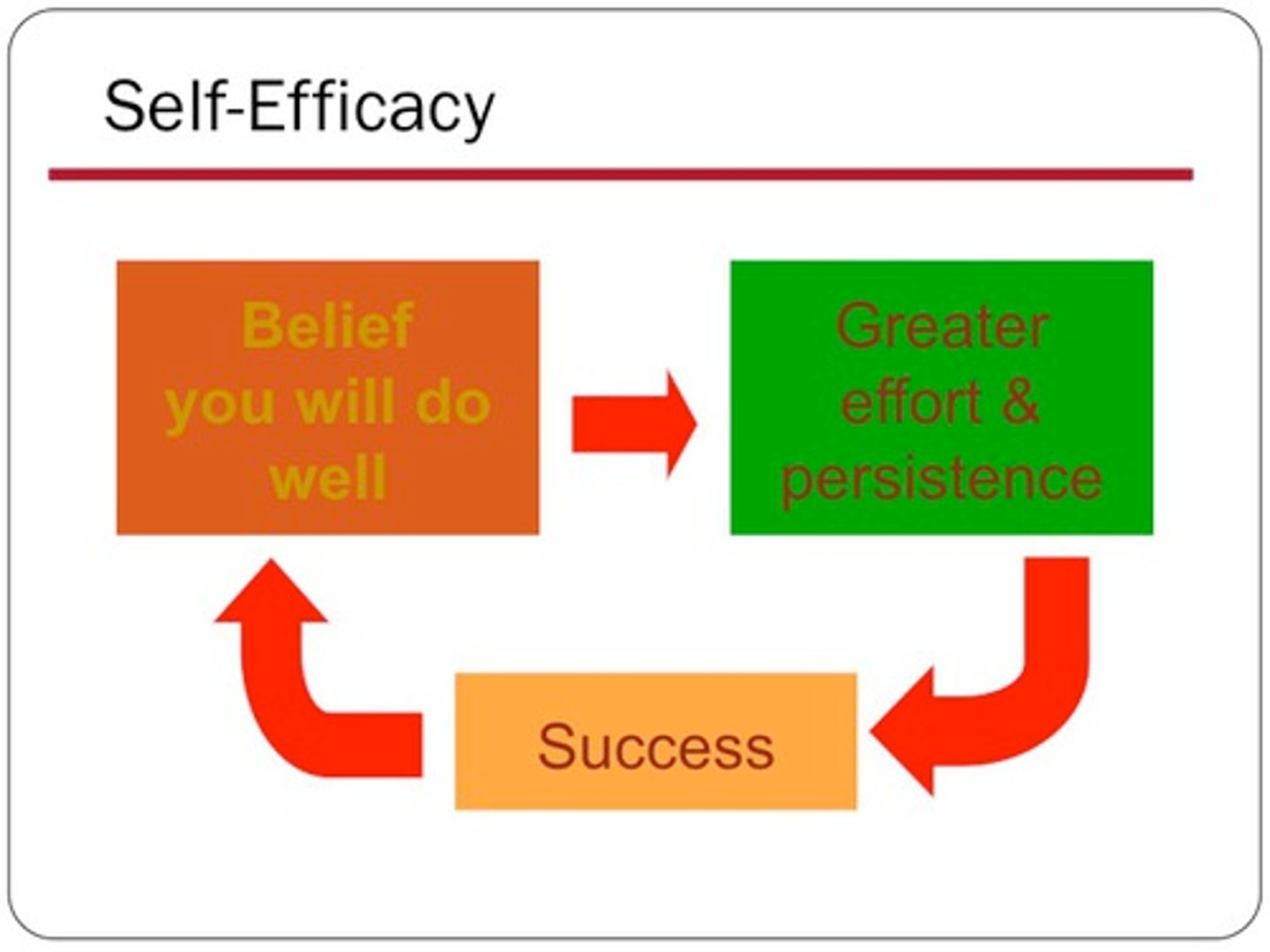
Mischel research/person-situation controversy
Mischel looked at the research compiled on trait prediction of behavior and found it to be lacking. He concluded that there was no evidence for cross-situational consistency in behavior - and thus no evidence for the existence of personality as it had been previously conceptualized. Mishcel said that personality often changes according to a given situation. Mischel's view is called situationism, the idea that personality and behavior often vary considerably from one context to another
Situationism
Situationism, the idea that personality and behavior often vary considerably from one context to another
Evaluation of the social cognitive approach
- The social cognitive approach is too concerned with situational influences on personality. It ignores the role played by traits and other enduring qualities of personality
- Social cognitive theory overlooks the role biology plays in personality
- In its attempt to incorporate both the situation and the person into its view of personality, social cognitive psychology tends to lead to very specific predictions for each person in any given situation, making generalizations impossible
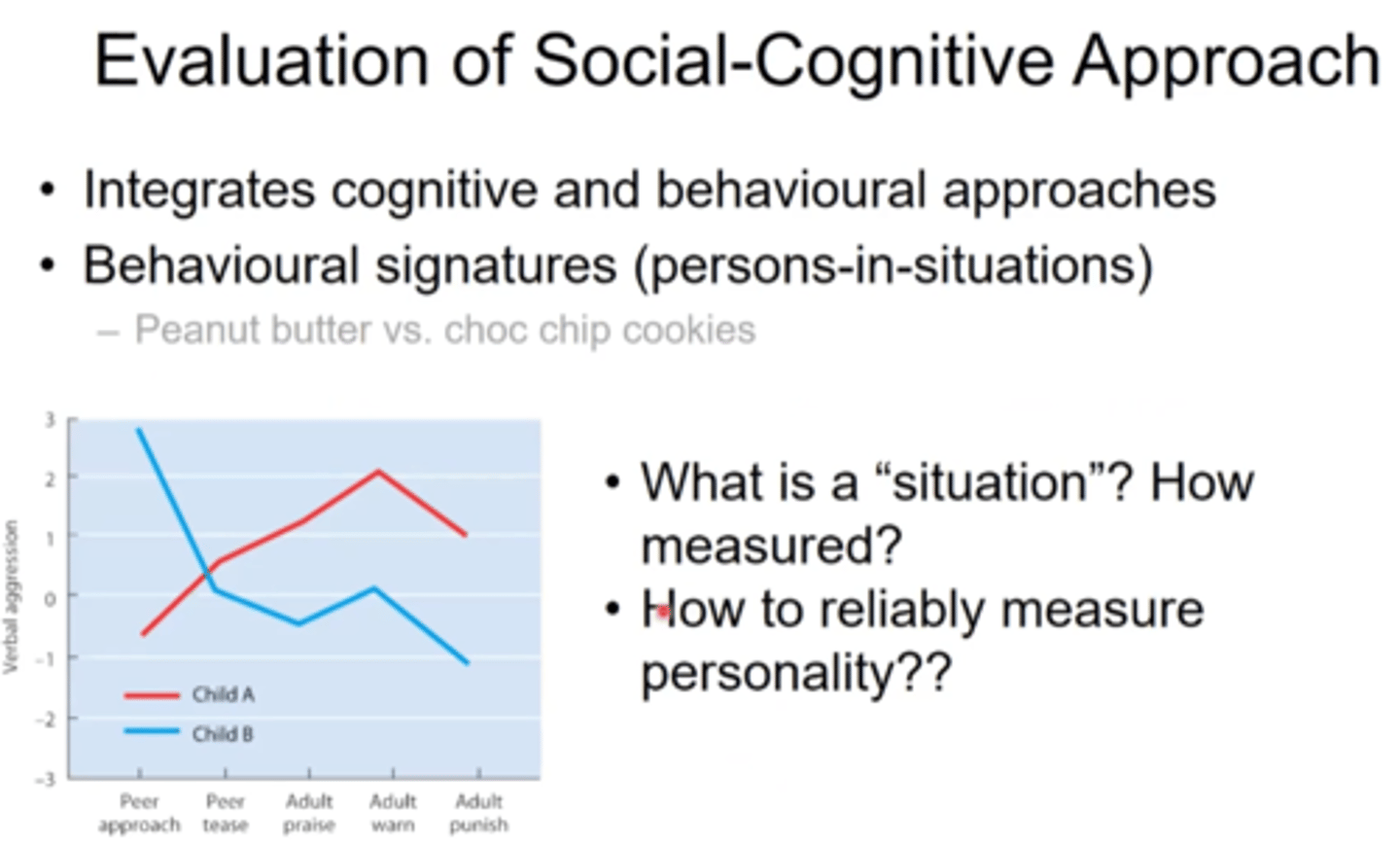
RAS
Reticular Activating System (RAS): Involved in arousal and alertness; linked to introversion/extraversion.
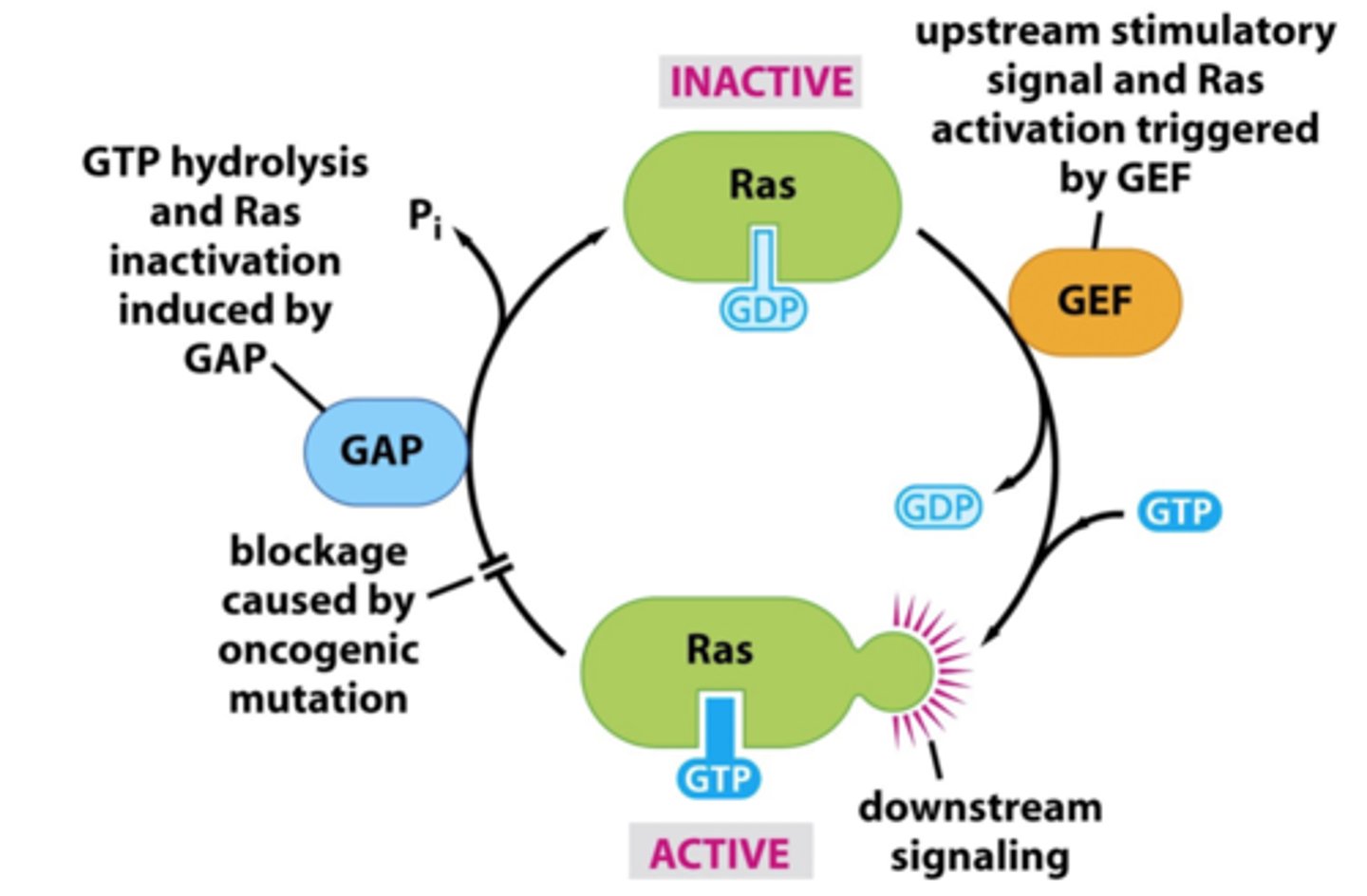
BIS
Behavioral Inhibition System (BIS): Sensitivity to punishment, related to avoidance behavior.
BAS
Behavioral Activation System (BAS): Sensitivity to rewards, linked to approach behavior.
Key research conclusions of RAS, BIS/BAS
Biological systems influence traits like extraversion and neuroticism.
Behavioral genetics
Studies show genetic influence on personality traits.
Evaluation of biology of personality
Strengths: Empirical evidence for biological bases of traits.
Criticisms: Biological determinism and lack of environmental consideration.
Why do psychologists assess personality?
They asses personality for career counseling and job selection to clinical evaluation and criminal risk.
Empirically keyed test
Empirically keyed test: A type of self-report test that presents many questionnaire items to two groups that are known to be different in some central way
The researcher would give these two groups a large number of questionnaire items and then see which items show the biggest differences between the groups. Those items would become part of the scale to measure the group difference.

Minnesota Multiphasic Personality Inventory (MMPI)
Minnesota Multiphasic Personality Inventory (MMPI): The most widely used and researched empirically keyed self-report personality test
- Initially constructed in the 1940s to assess "abnormal" personality tendencies
- Most recently, MMPI-3 is used around the world to assess personality and predict outcomes
- Also includes items meant to assess whether the respondent is lying or trying to make a good impression (social desirability)
- Also a tool for employment decisions
Used in forensic settings to assess criminal risk

Neuroticism Extraversion Openness Personality Inventory-3 (NEO-PI-3)
Paul Costa and Robert McCrae constructed the Neuroticism Extraversion Openness Personality Inventory-3 (NEO-PI-3), a self-report test assessing the five-factor model: OCEAN (the 5 big traits)
Projective test
Projective test: a personality assessment test that presents individuals with an ambiguous stimulus and asks them to describe it or tell a story about it, to project their own meaning onto the stimulus
Rorschach Inkblot test
Rorschach Inkblot test: A famous projective test that uses individuals' perception of inkblots to determine their own personality
The test is not reliable (two different scorers would agree on the personality characteristics of an individual) and it is not valid (does not predict behavior outside of the test)

Thematic Apperception Test (TAT)
A projective test that is designed to elicit stories that reveal something about an individual's personality (developed by Christiana Morgan and Henry Murray in the 1930s)
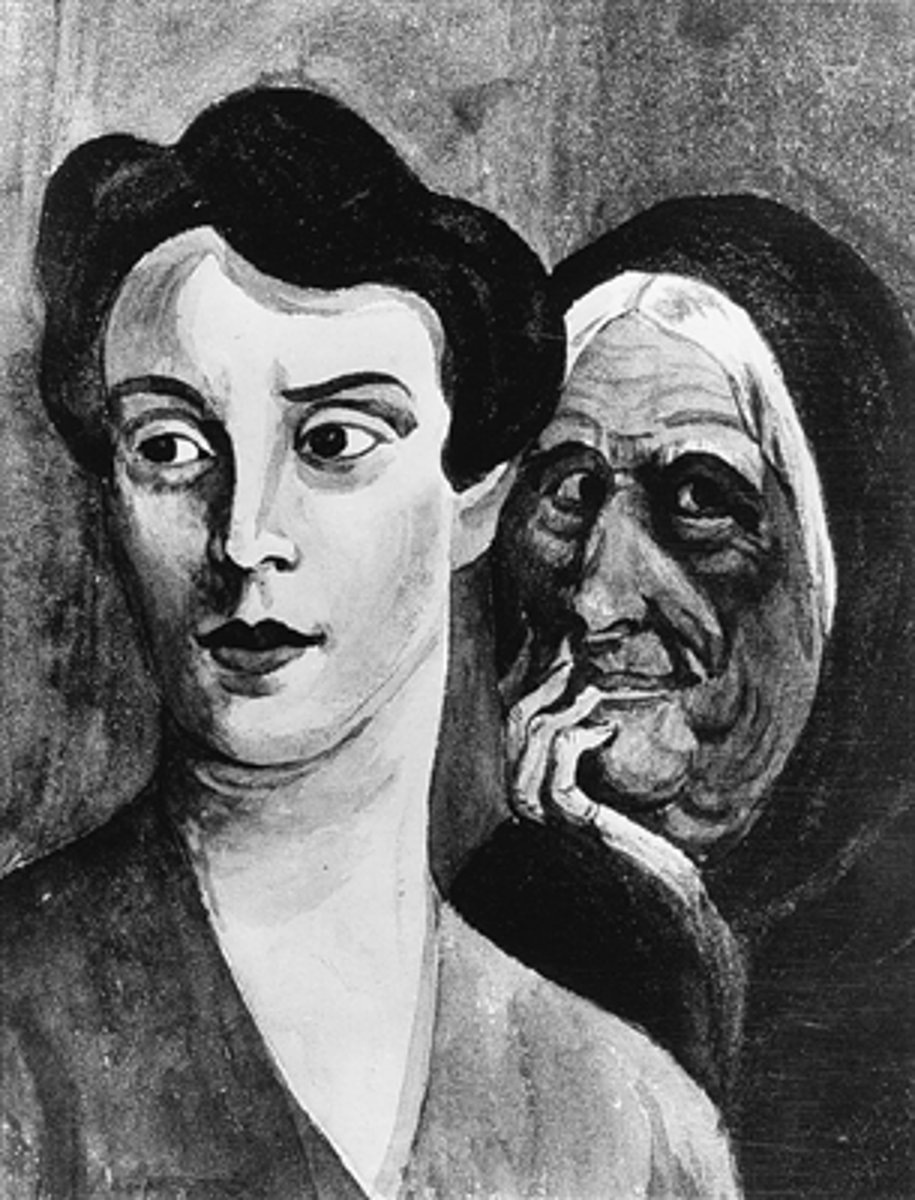
How does personality affect health?
Personality impacts behavior and lifestyle choices which in turn also affects one's health
How does personal control affect health?
- Feeling in control can reduce stress during difficult times and can lead to the development of problem-solving strategies to deal with hardship
- Personal Control has been linked to lower risk of cancer and cardiovascular disease because of its link to healthy behavior
- It has been related to emotional well-being, successful coping with a stressful event, healthy behavior change, and good health
Self-efficacy
Related to success in a wide variety of positive life changes such as:
- Achieving weight loss
- Exercising regularly
- Quitting smoking
- Reducing substance abuse
- Practicing safe sex
- Evidence shows a link between self-efficacy and cardiovascular functioning following heart failure
- Less likely to suffer a second hospitalization due to heart failure
- More likely to live longer
- Related to finding a solution
- Can-do-attitude helps people achieve their goals
Optimism
- Physically and mentally healthier than pessimists
- Related to effective immune system functioning
- Associated with better cardiovascular health and better outcomes among individuals with coronary heart disease

Behavior Patterns
Type A behavior pattern: A cluster of characteristics - including being excessively competitive, hard-driven, impatient, and hostile - related to a higher incidence of heart disease
Type B behavior pattern: A cluster of characteristics - including being relaxed and easygoing - related to a lower incidence of heart disease
Type D behavior pattern: A cluster of characteristics - including being generally distressed, having negative emotions, and being socially inhibited - related to adverse cardiovascular outcomes